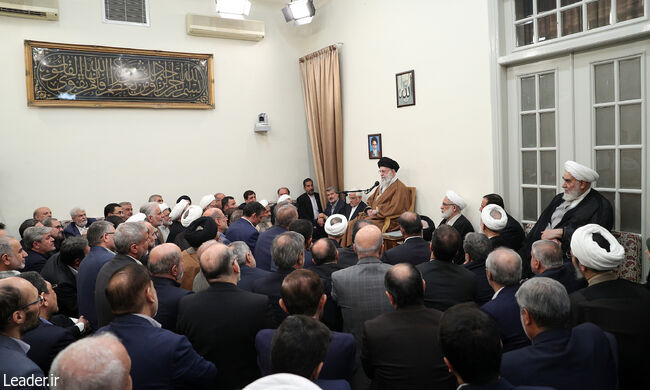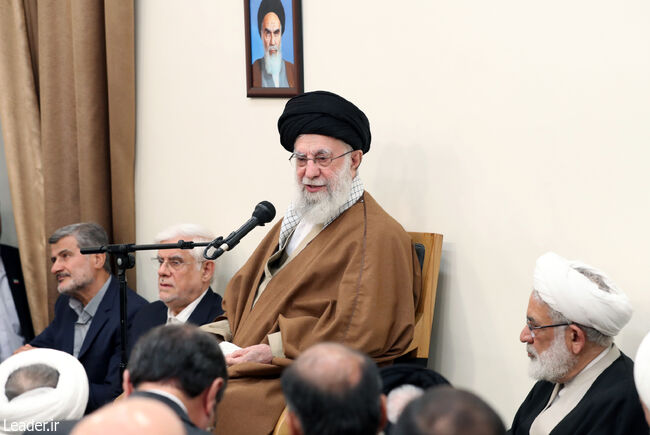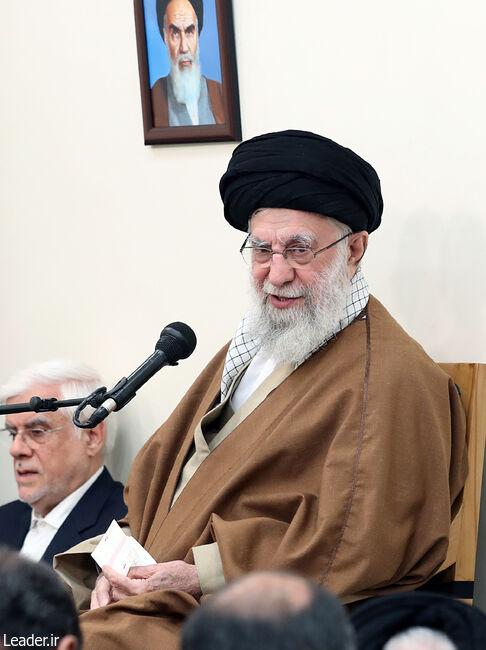During his inaugural New Year meeting with high-ranking officials from the three branches of government, the Leader of the Islamic Revolution identified a lack of follow-through as the critical gap hindering national objectives. He called for a unified effort across all branches to operationalise the year's designated slogan.
He also cautioned against both excessive optimism and undue pessimism regarding the outcome of the Oman talks. He stressed, "The country's efforts to achieve its goals in all areas must continue with greater momentum, and nothing should be tied to the results of the negotiations."
In the meeting, Ayatollah Khamenei emphasised that follow-through is more critical than decision-making itself, stating,
"The country has sound laws, regulations, and necessary plans in place, yet it is the lack of follow-through that prevents the goals from being realised in a satisfactory manner." He stated that issues such as excessive gasoline consumption, insufficient progress in educational equity, and the challenges faced by disadvantaged groups can be resolved through consistent follow-through. He added, "While the enthusiasm and motivation of the heads of the three branches and officials are commendable, they are insufficient. Due to a lack of necessary follow-through, the decisions and directives of officials weaken within the managerial hierarchy, and, in many cases, they are not implemented at all."
The Leader of the Revolution described energy conservation as an essential imperative, stressing, "Even before the general public, government agencies—as the largest consumers of various energy resources—must make themselves get used to conservation. This, too, requires diligent follow-through."
He declared support for the realisation of this year's slogan as the shared mandate of all three branches of government and relevant institutions, stating, "By investing in production, the country can overcome many of its challenges. Therefore, the Ministry of Economy, the Central Bank, and other related entities must channel available capital and liquidity in society toward productive investments."
Ayatollah Khamenei described investment in production as a commendable endeavour. He said, "Investment security must be guaranteed, and obstacles facing economic actors in the production sector must be removed."
He emphasised that the concerted efforts of all three branches of government, particularly the administration, would pave the way for realising this year's slogan, stating, "When domestic investment flourishes, foreign investors will also become eager to engage in Iran's economy."
The Leader of the Revolution described investment in domestic production as the most effective way to counter sanctions. He said, "Lifting the sanctions is not in our hands — but neutralising them is within our control. There are numerous ways and suitable domestic capacities to achieve this, and if this goal is realised, the country will become impervious to the effects of sanctions."
He emphasised the importance of expanding relations with neighbouring countries, the economic hubs of Asia and Africa, and other nations. He said, "This too requires persistent follow-through, particularly to reform certain practices at mid-level tiers of administration."
Ayatollah Khamenei also praised the President's diplomatic engagements with foreign leaders and the Foreign Ministry's activities as "highly positive and effective."
He referred to the Oman-mediated talks as just one among dozens of tasks the Ministry of Foreign Affairs handled and stressed, "The country's affairs must not be tied to these negotiations. The mistake made during the JCPOA process—where everything in the country was made dependent on the progress of the talks—must not be repeated. Such an approach leaves the nation hostage to conditions, with everything from investment to other critical matters becoming stalled pending negotiation outcomes."
The Leader of the Revolution emphasised the necessity of continuing Iran's activities across all domains—industrial, economic, infrastructure development, cultural, and major projects—stating decisively, "None of these matters have any connection whatsoever to the Oman-mediated talks."
He cautioned against both "excessive optimism and pessimism" regarding these talks, and added, "In the initial stages, the country's decision to enter negotiations was handled well. From this point forward, the process must continue with care and precision, while the red lines for us and the other side are absolutely clear."
Ayatollah Khamenei added, "The negotiations may succeed, or they may not. We are neither overly optimistic nor overly pessimistic about these talks, although we are deeply sceptical of the other side, we are firmly confident in our capabilities."
The Leader of the Revolution emphasised the critical need for precise and uncompromising implementation of the Seventh Development Plan, stating, "This sound program, grounded in the nation's overarching policies, must be executed with rigour and exactitude from the very outset."
While extending New Year's greetings to officials and their families, the Leader highlighted the significant role of the solidarity and support of spouses and families in enabling officials to fulfil their duties better and achieve results. He also expressed the hope that the points outlined in the report presented by the First Vice President would be realised within a reasonable timeframe.
At the conclusion of his remarks, Ayatollah Khamenei spoke about the unprecedented crimes committed by the criminal Zionist gang in their deliberate attacks on patients, journalists, ambulances, hospitals, and the oppressed women and children of Gaza. He said, "These atrocities require an extraordinary level of brutality, which the criminal occupying group definitely possesses."
He advocated a coordinated economic, political and, if necessary, operational response from the Islamic world as a serious necessity, and added, "Certainly, Allah will bring down His scourge upon these oppressors, but that does not diminish the heavy responsibilities that fall upon both governments and nations."
At the beginning of the meeting, Mr. Aref, the First Vice President, highlighted the good cooperation and coordination among the three branches of government in advancing the nation's progress. He outlined the administration's structured plan to improve economic growth and employment, stabilise the economy and control inflation, enhance income distribution, support vulnerable groups, address imbalances in the energy sector, and implement key development projects. He said, "Over the past seven months, the government has taken measures to improve living conditions, promote educational equity, and expand foreign cooperation, while also preparing effective programs for further progress."



